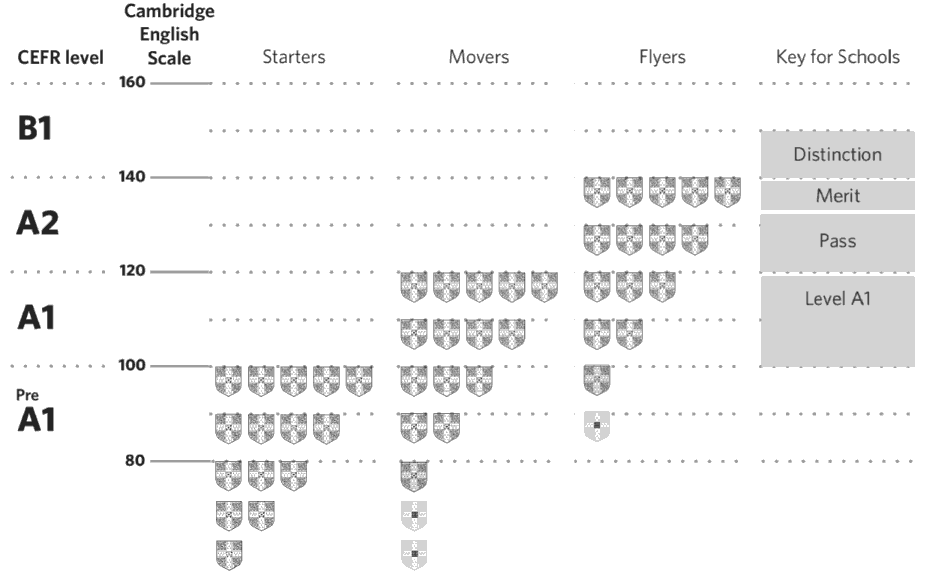Helping young learners on their way with the Cambridge Young Learners exams

Guest Contributor Anne Robinson
Hello! My name is Anne Robinson. I live in Cantabria, on the north coast of Spain. I’m a teacher, a teacher trainer for Cambridge Assessment and an author of five course books for young learners (Fun for Starters, Movers and Flyers, Fun Skills 3 and Fun Skills 5), all published by Cambridge University Press.
My involvement with the Cambridge Young Learners exams
Since 1997, when the Cambridge Young Learners Exams began, I’ve been organizing test sessions in Cantabria, the area in Spain where I live. I’ve seen many positive effects that the Tests have had on learning and teaching. I’d like to tell you here about some of these benefits.
What are the Cambridge Young Learners exams?
But first, a quick introduction to these exams. There are three levels: Pre-A1 Starters, A1 Movers and A2 Flyers and are taken by learners around the world and aim to make learning fun. As you can see from their names, they are aligned to the Common European Framework. The exams are designed for learners between 7 and 12 years old, although sometimes exam candidates are slightly younger or older. The exams themselves are fun too! With their attractive colour pictures, relevant, positive stories and engaging tasks, exam day is a day to look forward to!

What are our students learning? Where can they go next?
Very often, for schools, learners, parents and teachers, it’s hard to see where English classes are going. Children start learning words for topics like animals, family, home. Then, they learn more words and start producing more language. Very often, the same topics (animals, family, home) appear on the syllabus every year. Where are we going? What progress are learners making? Are they just learning the same things over and over again?
The Thematic Vocabulary List for Pre-A1 Starters, A1 Movers and A2 Flyers (pages 38-43 in the Starters, Movers and Flyers Word List) is a very useful resource to help everyone see how, within the same topic, language can (and should) become more challenging. Words become more ‘abstract’ (for example, you can’t show a flashcard of a wish or a dream, can you?) You can also compare the Word List to your syllabus or course book to check if the one you’re using also has a clear progression.
Other useful resources are the Grammar and Structures lists for Pre-A1 Starters, A1 Movers and A2 Flyers tests. You can find these in the Handbook for Teachers on the Cambridge Assessment website, along with breakdowns of each task and tips for teachers to share with students.
What’s in the Pre-A1 Starters, A1 Movers and A2 Flyers exams?
Having a clear grammar syllabus and lists is useful, but the best way to get an idea of what’s in the exams is to look at the Sample Papers . In the Resources for Teachers on the Cambridge Assessment website, there are two sample papers available for each level, including the audio files for the Listening papers.
As you can see from the Sample Papers, all four skills are tested at each level – Listening, Reading and Writing (tested together in one paper) and Speaking. Some tasks, like Listening Part 4, appear at all three levels. Although the task looks the same, small changes (like the language tested for example) make it considerably more challenging at A2 Flyers than it is at Pre-A1 Starters. As it should be.
Watching the online videos of speaking tests can really motivate students because they can see how well they can do in these situations. There are guides for the speaking tests available in the Resources for Teachers too.
What about the results?
Every student in the group who completes the Listening, Reading and Writing and Speaking papers for Pre-A1 Starters, A1 Movers or A2 Flyers will receive a certificate. There is no pass or fail. Depending on how many questions students have answered correctly, they will receive a certificate which shows between one and five shields for each paper. They will also receive a Statement of Results, which reports the results for each paper and explains the different skills demonstrated. There are also recommendations for the next steps to take in order to keep on improving. Here is a link to more information about A1 Movers certificates and Statements of Results.
With over twenty years’ experience in running these exams and seeing students grow with them, I’ve seen how motivating they are for everyone.
- Students gain confidence in using their English to communicate and in showing how much they can understand.
- Their parents appreciate having a clear, internationally recognized means of seeing what their children are learning and achieving.
- Teachers love preparing for the tests because preparation is fun and motivating and there are so many support materials available, both in the Resources for Teachers on the Cambridge Assessment website and on World of Fun.
When it comes to the time for students to take higher level exams, the knowledge and experience that they have accumulated mean that students accept and prepare for new challenges without fear or anxiety.



